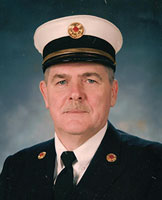By Bill Adams

There’s more to purchasing a new fire truck than understanding just the mechanical aspects of apparatus construction.
There are many unknowns that, combined with negative perceptions of prior purchases, can affect a firefighter’s decision to participate on or with an apparatus purchasing committee (APC) including a lack of accountability, inadequate financial oversight, no overall supervision, no evaluation of past committee performance, no preplanning, and a lack of time. As demoralizing as it sounds, an APC can be its own worst enemy in discouraging participation.
Time
Firefighters may not want to—or will not—participate because of a lack of personal time. Many have multiple places of employment. There are family obligations. Some participate in personal activities not involving the fire department. Fire department hierarchy should not denigrate career or volunteer firefighters for personal priorities, interests, and life choices occurring outside the fire station. (Outside conduct reflecting disparagingly against the fire department or detrimental to its goodwill, morale, and discipline is a fine line not defined or addressed herein.)
Volunteer firefighters should not be forced to participate in any activity not made known to them prior to joining. Career firefighters’ time on the job is remunerated. It is inappropriate and probably illegal to mandate they work off-hours without compensation—whether it be to inspect apparatus at other departments, attend trade shows, visit apparatus manufacturers, or participate in factory inspection trips. If they do so voluntarily, that is their own business and possibly that of a professional organization representing them. Unfortunately, nonparticipation may affect career advancement. Career firefighters also have families and personal lives.
The time element might be used as an excuse to mask personal dissatisfaction. The following hypothetical examples can be contentious observations. Merely pointing them out can provoke resentment and even reprisal by the powers that are. No firefighter wants to hear, “Don’t challenge my authority!”
- It doesn’t matter what the committee votes for; the chief always gets what he wants.
- The town buys low bid regardless of compliance with the specifications; we’re wasting our time.
- Why bother writing specifications when we always buy from the same manufacturer?
- We keep buying newer versions of the same old stuff. They live in the past and refuse to look to the future.
- Whatever the mayor’s brother-in-law sells is what we buy, whether we need it or not. Why waste my time?
- Half the people on the committee don’t have a clue. They’re just along for free plane trips and steak dinners.
Financial Oversight
Fiscal responsibility is important, often misunderstood, and occasionally abused. It is a multilevel intertwined obligation of the fire department, its APC members, and the authority having jurisdiction (AHJ). When a political subdivision does the purchasing, it acts as the “final” AHJ, and the onus of financial oversight (accountability) rests with it. It determines the amount of revenue to be appropriated, how the funds will be raised, and when they can be spent—all of which is usually subject to voter approval.
Although APC members have no direct control over an AHJ’s financials, they should be cognizant of the purchasing process. At any time, in any forum they could be asked: Where’s the money coming from? How much will the rig really cost if the bid price is financed over 10 years? How will this purchase affect the tax rate? Some firefighters might be intimidated. It may not be appropriate to allow individuals who can’t balance their own checkbooks to spend a million dollars of taxpayer money without oversight.
Fiscal responsibility begins with the fire department providing the AHJ with an estimated cost—as close as possible—of a new rig, projected delivery time, and anticipated price increases. Projecting prices is imperative for the AHJ to secure adequate funding and to give the APC and the vendors a not-to-exceed budget. Some APCs will not disclose the budgeted amount to vendors for fear the vendors will try “to get it all.” Having a year’s worth of time and effort go down the drain because final bids exceed a secreted cost could dissuade firefighters from serving on another APC—besides, it’s not fair to the vendors. Financial oversight at the committee level is the responsibility of the APC chair, who must differentiate needs and necessities from individual committee members’ wants, whims, and wishes.
Preplanning
Forward-looking political subdivisions including planning and zoning commissions have short-term and long-term plans. The fire service should too. The APC should consult all of them. A 75-foot aerial ladder being purchased to meet today’s hazards might not be suitable for the multi-story buildings being planned within the next five years.
Mutual-aid and mutual-assistance preplans are becoming more commonplace. Many have minimum requirements—albeit some are not formalized, but they still should be referenced. Firefighters may lose interest in participating if the APC’s last two purchases often sit in the barn because they are not compatible to interface with neighboring fire departments.
Accountability and Deadwood
APCs in political subdivisions answer to the AHJ, usually a senior elected official or supervisory board. Accountability can be routed through many hands. An APC might answer to the fire chief’s designee, who answers to the chief, who answers to the city financial department that reports to the city council and ultimately to the mayor. If it’s a “good” delivery, the mayor and fire chief take credit and have their picture in the newspaper with the new rig. If it is not a good delivery, credit can turn into accountability (blame) that filters down to individual APC members. Some firefighters don’t want to put themselves into what could be an unenviable position if everyone in the department hates the rig.
Deadwood is more than just a city in South Dakota. Regardless of how an APC is chosen, there should be a process to purge it of deadwood—those members who are prejudiced for or against a specific manufacturer, those who can’t make a decision, and those who are just along for the ride. The AHJ is obligated to ensure all APC members (including the chair) are capable, conscientious, and responsible. Members should be required to vote, with a record kept on major decisions and those that do not have unanimous consent. It is discouraging for prospective and existing APC members to continuously hear, “I don’t care.” “It doesn’t matter.” “I’m fine with whatever the rest of you want.”
Committee Makeup
There are people who contribute toward an apparatus purchase such as former chiefs, politicians, administration and maintenance staff, and the aforementioned financial people. There is no disparaging the valuable resources they might provide. However, unless they are active firefighters, it is debatable if they should be voting members of the APC, especially when addressing the firematic and operational components. That is a harsh but possibly truthful statement. Some examples include the following:
- Performing AHJ financial oversight does not necessarily require membership on the committee. Money people whose sole responsibility is to allocate funds for a purchase and who are not active firefighters probably shouldn’t participate in arguing over the cost of a light bar.
- Maintenance staff can tell the committee what works and what does not work mechanically, what lasts and what wears out prematurely, and what is reliable and what is not. With apparatus today being very complex and electrically oriented, most repair work is done by accredited fire service repair facilities. The head mechanic at the village garage maybe shouldn’t have a vote in how much and what size supply line to carry.
- An administrative recording secretary who has been collecting Social Security for 10 years and hasn’t been on a fire truck in twice as long probably shouldn’t have a say in the number of folding steps to reach the hosebed or a vote on how many preconnects are needed.
- The treasurer is not necessarily entitled to a free lunch or a factory inspection trip just because his sole function is to sign the check.
- Former chiefs, especially inactive ones, shouldn’t be voting on the particulars of a new purchase. Despite their wisdom and experience, they’ve had their turn. Junior officers including lieutenants and captains will be inheriting the new rig. They should have an active say.
. . .
Active firefighters who want to participate in the purchasing process may be discouraged by observing APC membership being awarded to those who live in the past and are easily influenced by polo shirts, factory inspection trips, and free meals—another harsh but sometimes true statement. Membership should be for those willing to delve into the nitty gritty details of purchasing.
BILL ADAMS is a member of the Fire Apparatus & Emergency Equipment Editorial Advisory Board, a former fire apparatus salesman, and a past chief of the East Rochester (NY) Fire Department. He has 50 years of experience in the volunteer fire service.

